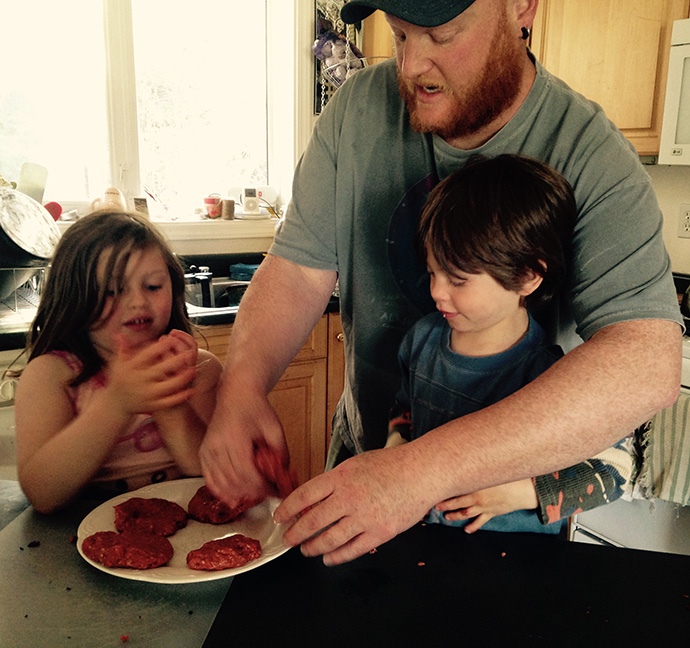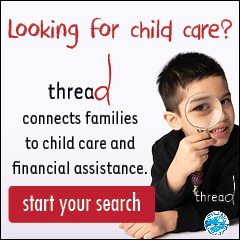life as a stay-at-home dad
5 Alaska men on full-time daddy duty share secrets & survival tips for making it work
By Amy Newman
Jared Rockman roots around in the magazine compartment of his black camouflage tactical bag, searching for something. A casual observer might think he’s double-checking supplies before heading out to hunt. But when he pulls his hand clear of the pocket, the truth quickly becomes apparent – Jared, a stay-at-home dad, was searching for a diaper.
“I’m trying to find the masculinity in it for sure,” he says, laughing about his non-traditional diaper bag.
The Anchorage father has embraced his role as stay-at-home dad to 4-year-old Charlotte and 1-year-old Bennett. And he’s not alone.
According to the Pew Research Center’s 2012 analysis of government data, roughly 2 million stay-at-home parents are dads, almost double since 1989. And the number who specifically chose to stay home – as opposed to having it thrust upon them due to unemployment or illness/disability – increased even more. In 1989, only 5 percent of stay-at-home dads chose that role; today, it’s 21 percent.
We talked to a handful of Alaska’s stay-at-home dads to learn what it’s like and the challenges they face.
A matter of finances
All parents wrestle with whether to send their child to daycare or have a parent stay home full-time. For those who opt to stay home, it’s usually the mother who opts out of the workforce. So what upends the norm? Simple economics.
“It was career based,” says Anchorage dad of two Drew Cobb, who stepped down as head of his family’s landscaping business in favor of his wife’s medical career. “I sacrificed my career for hers, knowing (hers) was going to have more monetary value.”
For Homer artist Josh Nordstrom, who ran a contracting business before his daughter’s birth eight years ago, the benefits that accompanied his wife’s teaching job was the clincher. But while the decision made financial sense, he admits there was an adjustment period.
“It was hard for me (at first),” he says. “I felt like I needed to be out there, bringing home the bacon. It was definitely a role change.”
Anchorage dad Aaron Bowman, agrees, saying he didn’t realize how much self-worth he derived from working until he quit his job to stay home with son Hasan, now 2.
For Josh, the initial awkwardness was short-lived, a necessary by-product of he and his wife’s ultimate goal: “We wanted to raise our kids and not have somebody else do that part of it,” he says. “I think that’s more important” than two incomes.
Advice from the trenches
Here are some tips from stay-at-home dads for other fathers stepping into the role. (Spoiler alert: It’s not much different from the advice given to stay-at-home moms.)
Define expectations. “It’s not rocket science,” Jared Rockman says of managing the household. “But you have to be real humble.” He and his wife Katie had conflicting ideas of what constituted an organized household. So when their second child was born, they created a daily, weekly and monthly chore chart to ensure they were on the same page. “As long as those get done, the house is in order,” he says.
Be creative. When deciding what activities to do with your child, don’t forget to choose things that you love to do, says Aaron Bowman. It might feel selfish – and it might seem selfish to others – but children recognize when their parents aren’t fully engaged, he says.
Drew Cobb agrees. “I’m not good at the arts and crafts,” he says. “But we can do Tonka trucks and practice casting in the driveway.”
Carve out “me” time. Whether it’s a walk in the woods when your wife gets home or doing something alone on the weekend, carving out time for yourself is vital, “otherwise you won’t be sane,” says Josh Nordstrom. And that “me” time goes for both moms and dads, Drew says. “There has to be a mutual respect of outlets for each other,” he says.
Dealing with societal stigma
Primary caregiver or not, today’s dads are more involved than ever before. They advocate for changing tables in men’s public restrooms and chafe at the notion that time spent with their children is “babysitting.”
Yet despite the overwhelmingly positive reaction toward their role as primary caregiver, dads say they still struggle with society’s somewhat skewed expectations.
Juneau writer Geoff Kirsch was surprised that people expected him to focus full-time on his writing, especially when his children, now ages 8 and 5, were younger.
“People would always ask me, ‘How is your writing coming?’ ” he recalls. “They would expect me to have another career going at the same time. If I were a regular stay-at-home mom, people wouldn’t expect that.”
It’s a throwback, they say, to the notion of dad as the primary breadwinner.
“People . . . think if you’re staying at home, you’re a deadbeat,” Josh says. “That’s kind of the weird part.”
Geoff brushes that notion off.
“If you have that problem, that’s your problem,” he says of people like his father, who thought Geoff should be out working (his dad eventually came around). “I don’t have that problem.”
Others can’t quite wrap their head around the “home” part of stay-at-home dad.
“ ‘That’s awesome, I want that job! You just get to hang out and do whatever,’ ” Drew says, laughing about comments from his guy friends. “I’m like, ‘No, I do the laundry, I clean the house, I cook.’ ”
Stay-at-home dads are still enough of an anomaly that people don’t quite know what to expect of them, Aaron says, a loophole he admits he often exploits.
Instead of playgroups, he often bundled up an infant Hasan, strapped him into a carrier and went kick sledding. Or with a thermos of coffee that served double duty as a bottle warmer, the two would spend an afternoon bird watching.
“People don’t have quite a pigeon-holed notion of what a guy’s supposed to do with their kids,” Aaron says. “So I feel in a sense maybe I do have some more freedom on that end of things.”
Beating the stay-at-home blues
Stay-at-home moms often bemoan how the experience can be isolating. Dads are no different.
“There’s times when I was craving adult conversation, versus always having a conversation with a 6-year old,” Josh says.
But it can be tough to find that outlet, since playgroups and toddler classes are dominated by stay-at-home moms.
“I’m friends with a lot of neighbors, and they’re stay-at-home moms,” Jared says. “They have their little wine parties, and they talk about this and that, so it would be tough to get in to that group.”
Geoff joined a mom’s group when his son was born – “The e-mails would always start off, ‘Hey Ladies (and Geoff)’,” he laughs – and says he looked forward to the weekly brunches.
But for the most part, the dads opted for natural connections or one-on-one interactions versus joining an organized group. Drew hangs out with several stay-at-home dads married to his wife’s colleagues. Jared and Aaron arrange playdates with neighbors.
And they all say their wives are good at letting them have kid-free time to recoup, whether it’s an evening out with friends or a weekend fishing.
Despite the challenges, none of the dads we spoke with had any doubts about their decision, and are grateful for the bond they’ve built with their children.
“I’ll always help out with the kids,” Jared says. “Bare minimum, I’m going to be a way more involved dad. I don’t see how I can regret that.”

.jpg)









